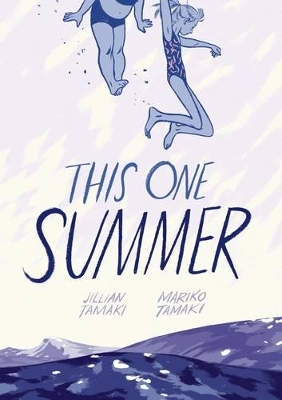Reviewed by nannah on
This One Summer is one of those beautiful and somewhat melancholy graphic novels that stick with you and makes you think about it more and more that time goes by. I think the more I do think about it, the more I like it.
Content warnings:
Suicide attempt
In-book misogyny (& challenged by other characters)
Every year, Rose and her family go to their Awago Beach lakehouse, and every year Rose spends time with her friend, Windy, who has a cabin there too. But this summer, Rose is twelve and Windy ten. Their age gap is becoming more apparent, with Rose becoming interested in boys, and Windy still wanting to dig holes in the sand and never wanting to get married. That’s not all: Rose’s parents are fighting, and then she and Windy find themselves involved in a drama that opens their eyes to what teenage life might be like.
I don’t know what it is ... maybe it’s the incredible art, the monochromatic purple coloring, or the very minute nuances in facial expressions, but this graphic novel is something else. It’s incredibly gripping and says a lot more between the dialogue than with its actual words (maybe that’s why a lot of reviewers say “nothing really happens”, when there’s actually lots going on).
The entire story happens through Rose’s eyes, whether it be overhearing her parents fighting (and she never really understands what about until she overhears another conversation later in the book). Things don’t always add up here until later scenes seen or overheard through Rose; the book kind of has an attitude of “you’ll understand when you’re older”.
I can’t explain this well, but the book is a treasure of a coming-of-age story; it feels so real. The way the kids hear older boys calling their girlfriends “sluts”, and then Rose calling girls sluts in a derogatory way because she likes those boys. The way her younger friend Windy calls her out on it, because she’s not yet at that age where she wants to be a part of that culture (but let’s be real here: Windy’s a lesbian). It’s just such a good story of what it’s like to actually be on the cusp of becoming a teenager and absorbing influences from all sorts.
Not only that, these authors know exactly what it’s like to be kids. The dialogue, the gestures, the specific looks; they all perfectly encapsulate childhood. And the character design? Superb. I adore the style and the way everyone’s design differs from one another. They’re people, not perfect designs, not perfect human specimens, etc.
I think I’ll like this more as time goes by, and I’ll definitely read it again. It’s a beautiful novel with lots of layers (the parents, the kids, the teenagers, and how their separate storylines come together -- or, at least, how they all come to impact each other’s). It’s probably one of the best coming-of-age stories I’ve ever read.
Reading updates
- Started reading
- 3 September, 2019: Finished reading
- 3 September, 2019: Reviewed
